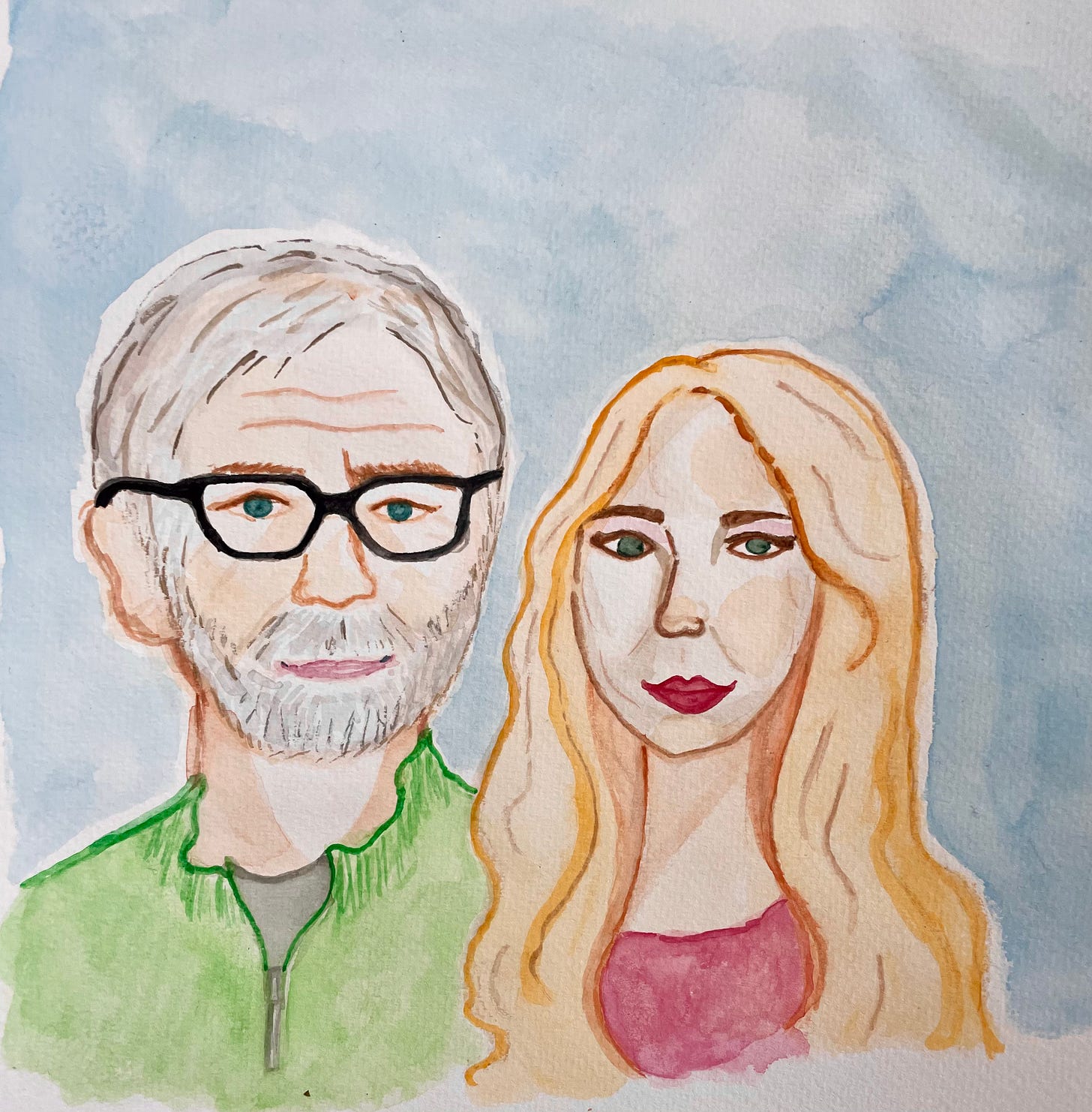You may know the ‘Five Stages of Grief.’
Let’s recite them together: Denial, Anger, Bargaining, Depression, Acceptance.
You may also know that were never meant to apply to the bereaved.
Elisabeth Kübler-Ross came up with the stages after chatting with terminally ill patients who were facing their own deaths. They told her how it felt to know they were going to die, and she looked for similarities among their feelings.
Then, Elisabeth organized those similarities into a neat and tidy order of stages, no doubt setting the tone for the rise of the internet listicle, forty years before the birth of Buzzfeed (“#3 will shock you!”).
For some reason, anecdotal findings from 1969 smooshed into categories were repeatedly misinterpreted and then somehow found their way into contemporary science books and psychologists’ toolboxes.
(I have heard “grief isn’t linear” in the same breath as “the fourth stage of grief” from more than one therapist. In this case, both things can’t be true!)
We don’t have assignments for any other life experience, and the notoriously messiest experience of all has publicly-accepted homework attached. Your loved one dies? Start your stages! Your goal is to get to Level 5. Acceptance means GAME OVER!
Doesn’t this seem, um…not how it goes at all?
Why did scientists and gurus alike so quickly accept the concept then? No doubt, for the reasons outlined in this article: “We are pattern-seeking, storytelling primates trying to make sense of an often chaotic and unpredictable world.”
Of course.
Death is the most chaotic, unpredictable, sci-fi horror we go through while on earth, and it’s the only experience that is 100% guaranteed. We have no idea what we’re doing when it comes to loss or mourning, so creating some fake stages probably wasn’t the worst idea.
Except that it makes a mourner feel like they’re doing grief wrong if the feelings don’t go in order, or at all. (I still don’t fully understand “bargaining.”) And if a different dominant feeling pops up, then what? Is it supposed to be an intermission?
This has been on my mind the past couple weeks, as I began my grief journey with a bang: I threw a shoe against the ground when I couldn’t figure out how to untie the knotted laces. I think I even yelled, “Stop!” but I don’t know what or who I was yelling at.
Stop...you laces for being in a knot?
Stop…designer of this shoe from continuing to make laces that tangle?
Stop…everything that feels like a tangle?
Stop…wonderful people dying for no reason?
Stop…taking my fathers away?
Stop…loved ones leaving me?
Any of these would make sense, and none of them do. I was unbearably irritated at the shoe and the world, and yelling into the ambient ethers was my only reprieve. It didn’t feel good, but it felt appropriate. It was an accurate expression of how I was coping, or failing to cope.
Words don’t make much sense during grief, which is why the question “How are you?” is impossible to answer.
Actually it is possible to answer, just not in words.
Words are created in the mind. So is the concept of grief arriving in orderly stages like parade floats. Words and stages and order come from the intellect during calm moments accompanied by an espresso, a library lamp, and classical music. They live in a tidy part of the brain that would be horrified at the very image of shoe-yelling.
But grief doesn’t calmly sit down. It doesn’t create structure. It doesn’t share the goal of “acceptance.” It doesn’t know what a goal is. More beast than human, grief doesn’t know words.
So the true answer to “How are you?” from a grieving person can’t be answered in words, but in a sound: a cry, a wail, a sigh, a howl, a scream, a moan, a whimper.
Sounds are created in the the belly. They come from moments when we are horizontal on the floor or sideways on a bed, too exhausted or stunned to straighten our animal bodies into a more civilized shape. They live in our inner caverns, murky and slimy with our greatest fears and unfinished memories and feelings from 2nd grade still tender but sharp like sea anemones. There is nothing tidy about them.
For me this past week, one sound was louder than them all:
Silence.
It wasn’t a soft sweet silence, but a raging one, like the quiet of the streets during lockdown or the absence of sound in a hospital room.
And it was the sound of my answer to “How are you feeling?” texts and how I expressed all the complex, unnamable feelings even to myself: Quiet. Not speaking. I couldn’t figure out how to articulate myself, so I quit trying.
Moreover, I remembered a “stage” of grief that I’d forgotten about: Irritability. Since the shoe-yelling incident, irritation dominated my thoughts and feelings. I was constantly annoyed and uncomfortable, as though there was always a rock in my shoe or an itchy tag on my clothes.
It was safer to be silent, because who knows if I’d take my grief out on a person the way I did that poor shoe.
I remembered being extremely irritable for months after my dad died, and for almost a year while recovering from serious illness. The feeling that set in last week was familiar—Oh you again—and so unwanted. Irritability is such an unsatisfying feeling, unlike sadness which can be gratified with a big cry.
It’s frustrating to be irritated, and frustration sounds like Gahhhhhhhh!, another sound I collected on my two-week grieving journey so far.
If the stages of grief were remotely valid, I don’t know why this irritation/frustration combo is missing. I’ve felt embarrassed about it, until I confessed to others that I’m more annoyed lately than sad, and they resonated with that less-than-glamorous aspect of mourning.
It’s not as photogenic as this feeling:
But it’s so real, and comes with a whole range of its own sounds.
I suppose any transition in life will feel frustrating until it fits a little better. Right now, the world—my world—isn’t right, so I’m desperate to scratch it off or unbuckle it. It’s itchy and irritating and sometimes suffocating and I want so badly to rip its seams, but I can’t. So instead, I yell at shoes.
In my last book I wrote about how lobsters, when growing out of their old shell, will begin to feel extremely uncomfortable, and that’s their cue to go into hiding until they grow new skin.
I guess that’s the reason behind my silence, my discomfort, and all the various sounds I’m making that feel more precise than words. There’s an easy lesson to find in nature, that it’s normal to withdraw when there’s nothing to say but everything to feel.
And when I allow myself to be fully in my lobster burrow, with no self-imposed pressure to assign words to emotion, my irritation finally transforms into something more satisfying, yet devastating. It’s a mix of anger and surrender, knowing that I can’t replace this new itchy annoying world with the old comfortable one that fits perfectly and smells like childhood. That doesn’t exist anymore.
What exists now is an irritating, annoying, itchy, uncomfortable reality that my sweet, beloved, inspiring, generous, kind stepfather is gone from physical form, and so is the world with him in it that I’ve known for most of my life.
I’ve now lost two parents, and nothing will ever make that okay. So I gahhhhh, and I grrrrr, and I whimper, and I yell, and I stay quiet.
There are so many ways we can think about grief other than in stages. I can easily see a casserole analogy, in homage to a classic grief food, where there are a ton of feeling ingredients mixed into this messy concoction and half of them are mysteries.
But for now, I hereby replace the 5 Stages of Grief with the 5 Million Sounds of Grief. Each one legit, each one more articulate than words. They can overlap, contradict, combine, and repeat. And when my proposal is accepted by Science, the question “Which sound are you making today?” will be just as common as “How are you doing today?”
And mourners will be able to sigh and screech their way through grief, rather than play CandyLand with five orderly squares that lead to Acceptance.
And if there is such a thing as acceptance, it could sound like the buzz of a tattoo pen, the engine of an airplane, the splash of ocean water, a howl into the night sky, or sweet soft silence that has somehow replaced the raging quiet, over time.
Thank you for reading Out of the Blue! This is where I share a weekly-ish essay on something I’m wondering about. For more personal content, including future dispatches from my grief journey, you can upgrade your subscription below. Either way, I very very much appreciate you!
ALSO, I’m teaching a retreat along with the life-changing Ruthie Lindsey at the Kripalu Center (in Western Massachusetts, very close to Hudson, New York) on March 3-5. Learn more here!!
And now:
What are your sounds of grief? Which emotions have you felt during a mourning process that didn’t seem to make sense? Any favorite paintings depicting irritation? Let me know!








Mari, first and foremost, my heart aches for the entirety that is losing your beloved step father. I am so sorry you have to face this again. You’ve captured grief so brilliantly here. Just last night I experienced an echo-sound of my own 5.5 year old grief baby simply because my husband and I were discussing what type of seat he needs to play guitar in our living room. I was whisked back to a horrible, tragic, shock of a death related to a stool we used to have. That death has been long “accepted” but I know now will never, ever, ever let me go. Mid-conversation panic set in right then and there. I was right back in that moment. What did I do to self soothe?
Hum. I learned 5.5 years ago that the vibration of humming helps your vagus nerve and parasympathetic nervous system kick in to calm down from a panic attack. I used the trick at the store, in an art show, in my bed, everywhere. And it still helps a little to this day. And it makes sense. The vibration of the cry, the moan, the argh, the grunted extended sigh, the makeshift laugh if we muster up the strength, and the Om. A built-in tool we don’t realize we use automatically. Unless we’re in deafening silence.
We try to convince ourselves that time heals our wounds because the prospect that it won’t is unbearable in the moment of our deepest grief. But the reality is, the scar is permanent and forever itchy and ugly. And that does not make for a very kind Hallmark card.
Take sweet care dear Mari. Hum if you can find the strength.
Hey Mari,
I'm new here and wasn't aware about the loss of your stepfather. My father/best friend (clarification: my dad was my best friend) just passed about a month ago.
I am so sorry for your loss.
I am sorry for mine.
The silence really resonated with me. I haven't wanted to do much of anything as I feel like I'm resisting reentering the world and any semblance of normalcy. I've been quiet.
Besides for the quiet are these incessant and unrelenting songs that I keep singing in my head. Songs that my dad used to sing around the house. Song from my childhood that I used to sing--and my dad loving listening to me.
Thanks for your words and sharing with us. I hope I can do more of than myself soon. <3